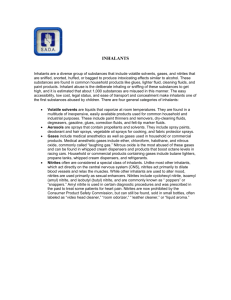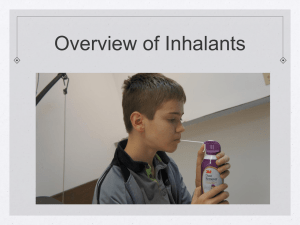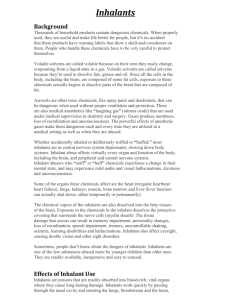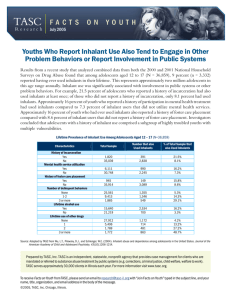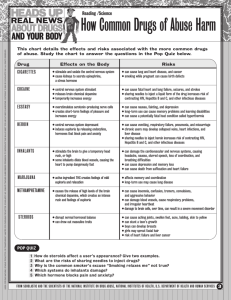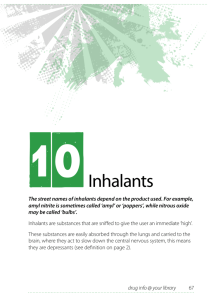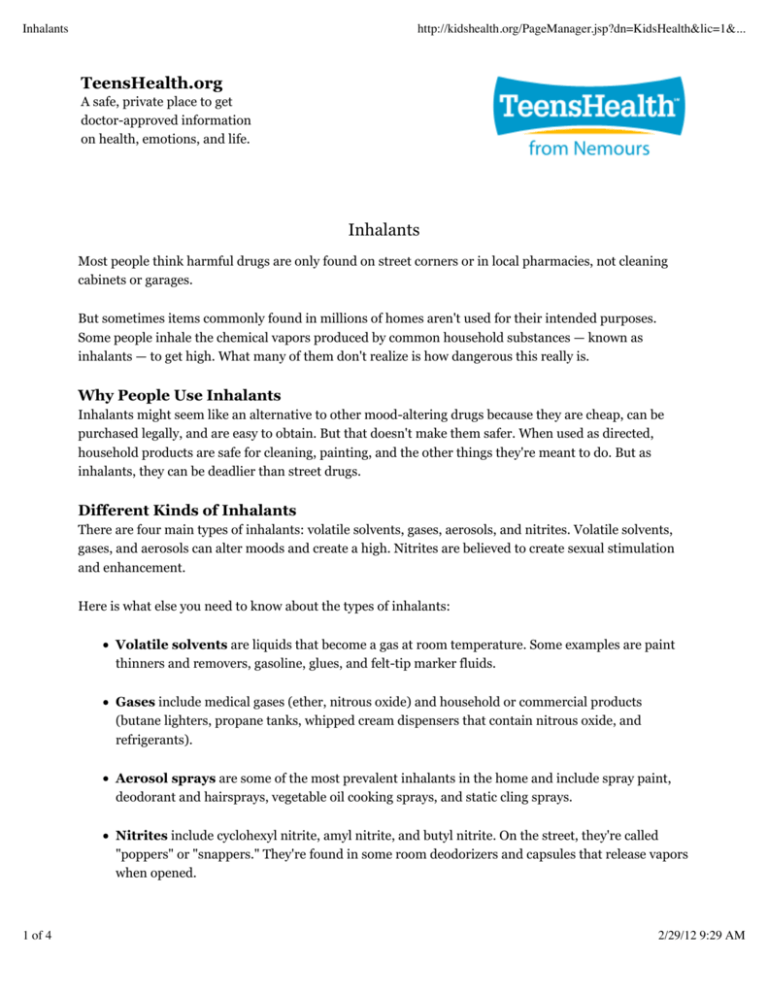
Inhalants
http://kidshealth.org/PageManager.jsp?dn=KidsHealth&lic=1&...
TeensHealth.org
A safe, private place to get
doctor-approved information
on health, emotions, and life.
Inhalants
Most people think harmful drugs are only found on street corners or in local pharmacies, not cleaning
cabinets or garages.
But sometimes items commonly found in millions of homes aren't used for their intended purposes.
Some people inhale the chemical vapors produced by common household substances — known as
inhalants — to get high. What many of them don't realize is how dangerous this really is.
Why People Use Inhalants
Inhalants might seem like an alternative to other mood-altering drugs because they are cheap, can be
purchased legally, and are easy to obtain. But that doesn't make them safer. When used as directed,
household products are safe for cleaning, painting, and the other things they're meant to do. But as
inhalants, they can be deadlier than street drugs.
Different Kinds of Inhalants
There are four main types of inhalants: volatile solvents, gases, aerosols, and nitrites. Volatile solvents,
gases, and aerosols can alter moods and create a high. Nitrites are believed to create sexual stimulation
and enhancement.
Here is what else you need to know about the types of inhalants:
Volatile solvents are liquids that become a gas at room temperature. Some examples are paint
thinners and removers, gasoline, glues, and felt-tip marker fluids.
Gases include medical gases (ether, nitrous oxide) and household or commercial products
(butane lighters, propane tanks, whipped cream dispensers that contain nitrous oxide, and
refrigerants).
Aerosol sprays are some of the most prevalent inhalants in the home and include spray paint,
deodorant and hairsprays, vegetable oil cooking sprays, and static cling sprays.
Nitrites include cyclohexyl nitrite, amyl nitrite, and butyl nitrite. On the street, they're called
"poppers" or "snappers." They're found in some room deodorizers and capsules that release vapors
when opened.
1 of 4
2/29/12 9:29 AM
Inhalants
http://kidshealth.org/PageManager.jsp?dn=KidsHealth&lic=1&...
Effects on the Body
People inhale chemical vapors in several ways, including sniffing,
snorting, or spraying the inhalant directly into the nose or mouth,
putting it into a bag or other container and then inhaling from there,
putting the vapor onto a rag, or inhaling nitrous oxide from balloons.
Because the high from inhalants only lasts a few minutes, some people
may inhale over and over again for long periods of time to maintain the
high, increasing the amount of dangerous chemicals entering and
damaging the body.
Inhalants can cause many changes in the body. Once the vapors enter
the body, some are absorbed by parts of the brain and nervous system.
All of the inhalants (except nitrites) slow down the body's functions,
similar to the effects of drinking alcohol. At first someone gets excited,
but then gets tired, has trouble speaking clearly or walking well, gets
dizzy, loses inhibitions, and may get agitated. It can sometimes take up to 2 weeks for the chemical to
completely pass from the body.
Other short-term effects of inhaling chemicals include:
increased heart rate
hallucinations or delusions
losing feeling or consciousness
nausea and vomiting
loss of coordination
slurred speech
Because inhalants are found in most homes, people don't realize they are incredibly addictive. People
who become addicted to using inhalants are likely to become long-term users. This puts them at risk for
these health problems:
brain damage (toxic chemicals may make people become slow or clumsy, have trouble solving
problems or planning ahead, suffer from memory loss, or become unable to learn new things)
muscle weakness
depression
headaches and nosebleeds
loss of sense of smell or hearing
Nitrites work differently. Instead of slowing down the brain and the spinal cord, they increase the size of
blood vessels and relax the muscles.
How Inhalants Kill
2 of 4
2/29/12 9:29 AM
Inhalants
http://kidshealth.org/PageManager.jsp?dn=KidsHealth&lic=1&...
Like most street drugs, inhalants can be deadly. Someone can die from abusing inhalants after trying it
only once. Causes of death include:
"Sudden Sniffing Death" — This is the most common cause of death from inhalant use. The
heart beats quickly and irregularly, and then suddenly stops (cardiac arrest). This can happen even
the first time a person tries an inhalant and is experimenting.
Asphyxia — Toxic fumes replace oxygen in the lungs so that a person stops breathing.
Choking — A user can choke on his or her vomit.
Suffocation — When vapors are inhaled from a plastic bag placed over the head, the bag can
block air from entering the lungs.
Injuries — Since people high on inhalants often make poor decisions, they might try to drive
under the influence or do something irrational, such as jump off a roof. They could also get burned
or start explosions if a spark ignites flammable inhalants.
Suicide — Some people become depressed when their high wears off.
Signs of Inhalant Abuse
Inhalants, like other drugs, have noticeable effects on those using them. Someone on inhalants may
suffer from a number of different ill effects, including:
mood swings
extreme anger, agitation, and irritability
exhaustion
loss of appetite
frequent vomiting
hallucinations and illusions
facial rashes and blisters
frequent runny nose and cough
dilated pupils
glazed or watery eyes
extremely bad breath
Of course, some of these things are signs of other health problems, not necessarily inhalant use. If you're
worried about a friend or loved one, talk to a parent, school counselor, or your doctor or school nurse.
Getting Help
If you think you — or a friend — may be addicted to inhalants, talk to
your doctor, school counselor, or nurse. They can help you get the help
you need.
3 of 4
2/29/12 9:29 AM
Inhalants
http://kidshealth.org/PageManager.jsp?dn=KidsHealth&lic=1&...
Several kinds of treatment are available for drug addiction; the two
main categories are behavioral (helping a person change behaviors)
and pharmacological (treating a person with medication).
Treatment for inhalant addiction is primarily behavioral. An expert in
drug treatment teaches people how to function without drugs —
handling cravings, avoiding situations that could lead to inhalant use,
and preventing and handling relapses.
As with any addiction, it can be difficult to stop without professional help and treatment. Overcoming an
addiction is not something that can be done alone; everyone needs support. The experts who help people
with addictions are trained to help, not judge. To find a drug treatment center in your area, check online,
check out the yellow pages, or ask a counselor for advice.
Reviewed by: Yamini Durani, MD
Date reviewed: January 2012
Originally reviewed by: Michele Van Vranken, MD
Note: All information on TeensHealth® is for educational purposes only. For specific medical advice,
diagnoses, and treatment, consult your doctor.
© 1995-2012 The Nemours Foundation. All rights reserved.
4 of 4
2/29/12 9:29 AM


